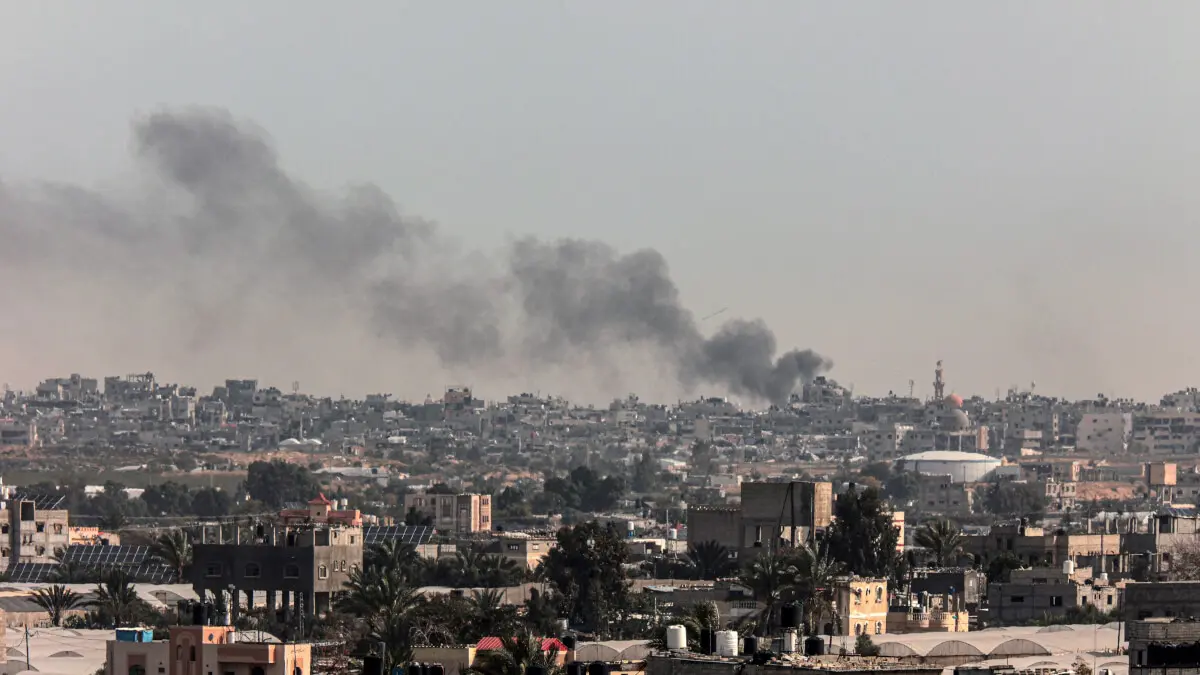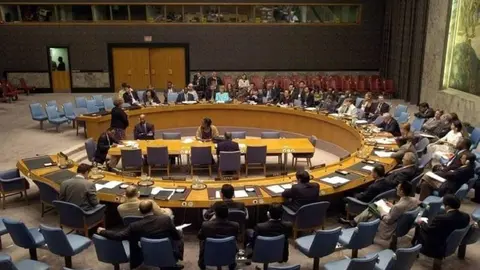Heavy Israeli bombardment of Gaza despite calls for an effective truce

Israel on Wednesday killed dozens of people as it shelled different parts of the besieged and famine-stricken Gaza Strip, where the Israeli army is continuing its operations around several hospitals.
In the last 24 hours, at least 24 people have been killed in the Palestinian territory, where the Israeli army has been waging a war against the Islamist Hamas movement since 7 October.
In the past two days, fighting in Gaza has continued unabated despite the UN Security Council passing a resolution on Monday calling for an "immediate ceasefire" and the release of some 130 Israeli hostages held in Gaza, including 34 who are presumed dead.
On Tuesday night, a fireball lit up the sky in the southern city of Rafah, the only urban centre in Gaza where Israeli ground forces have not entered.
About 1.5 million people are crowded in the area, many of them fleeing Israeli shelling.
On Wednesday morning, thick smoke emanated from a densely populated area in the north of the Strip.

Three hospitals targeted
Meanwhile, the Israeli army continues its interventions in and around three major Gazan hospitals, claiming that Hamas commandos are using them as a base of operations.
On Wednesday, Israeli forces said they were continuing their operation in the al-Shifa hospital complex in Gaza City, claiming to have killed "dozens of terrorists" so far and detained "hundreds".
Hundreds of residents have been forced to leave the area of the medical centre in the past week because of the operation, which began on 18 March.
🔴Operational update from inside the Shifa Hospital:
— Israel Defense Forces (@IDF) March 25, 2024
Weapons including AK-47s, grenades, explosives, mortars and magazines were located in the hospital's MRI complex, maternity ward and on its roof. pic.twitter.com/fHYqxv38vB
The army is also continuing its operations in Khan Younis in the south of the Strip in the area of the Naser and Al Amal hospitals, about a kilometre away, the army added.
Al Amal hospital is "out of service" and has "completely stopped functioning", the Palestinian Red Crescent Society said on Tuesday, following the evacuation of civilians there.
According to the organisation, thousands of civilians were still being held in the Naser hospital, which was surrounded by the Israeli army on Tuesday.
"The forced closure of Al Amal hospital, one of the few remaining medical facilities in the south [...], endangers countless lives," denounced the International Federation of Red Cross and Red Crescent Societies (IFRC).
#NEW from @IDF: Troops are continuing to conduct precise operational activities in the Shifa Hospital, as well as the areas of Al Amal and Al Qarara in Khan Yunis.
— Israel War Room (@IsraelWarRoom) March 27, 2024
The IDF and ISA are continuing to conduct precise operational activity in the area of the Shifa Hospital, while… pic.twitter.com/GLltQ33aeI
Famine
The need for aid in Gaza is pressing, but Hamas called on donor countries to halt airdrops of aid after 12 people drowned trying to reach food on Gaza's Mediterranean coast.
The Palestinian Islamist movement and the Swiss-based Euro-Med Human Rights Monitor said another six people died in stampedes trying to reach parachuted aid.
Egyptian Air Forces, in cooperation with the UAE Air Force, continued throughout the days of 24-25 and 26 March, carrying out air drops from El-Arish Airport to deliver tons of food aid and urgent relief materials to the isolated areas in North Gaza. pic.twitter.com/wQlCVOqLod
— Mahmoud Gamal (@mahmouedgamal44) March 26, 2024
"'There are people dying to get a can of tuna,' Mohamad al-Sabaawi, a Gaza resident, told AFP, holding a can in his hand after a scramble for an aid package.
Still, the US said it would continue to use the technique, while "working tirelessly to increase the flow of humanitarian assistance by land".
Hamas also demanded that Israel allow more aid trucks into the territory, which the UN says is on the brink of a "man-made famine".
The war, sparked by Hamas's 7 October attack on Israel, has destroyed Gaza's infrastructure and aid agencies say its 2.4 million people are in need of humanitarian aid.
Negotiations
The 7 October attacks left 1,160 people dead in Israel, mostly civilians, according to an AFP count based on official figures.
The Israeli retaliatory campaign has left at least 32,490 dead in Gaza, mostly women and children, according to the Health Ministry.
The Israeli army, far from de-escalating the fighting, said its planes have bombed more than 60 targets in recent days, including tunnels and buildings "where armed terrorists were identified".
The IDF publishes footage showing a recent airstrike on what it says is a member of a terror group surveilling troops in southern Gaza's Khan Younis.
— Emanuel (Mannie) Fabian (@manniefabian) March 27, 2024
According to the IDF, the operative was passing information on troop locations to other gunmen over a phone.
The operative was… pic.twitter.com/dnp4OXCQES
The fighting has continued despite the UN Security Council's call on Monday, with the US provoking Israel's ire by abstaining rather than vetoing the vote.
Meanwhile, Israeli and Hamas representatives are engaged in indirect talks mediated by Qatar, seeking a ceasefire and the release of hostages.
But both Hamas and Israeli Prime Minister Benjamin Netanyahu say the talks are not progressing and blame each other.
WATCH:
— Open Source Intel (@Osint613) March 27, 2024
CC footage catches the attack.
Hezbollah was successful in the latest rocket barrage https://t.co/ThcW3CAApa pic.twitter.com/i5NZb6aLe9
The war in the Gaza Strip has also led to a spike in violence on the Israel-Lebanon border.
Hamas ally Lebanese Hezbollah announced on Wednesday that it had fired rockets into northern Israel, whose emergency services reported one death in the area.
Hezbollah carried out the attacks in response to a bombing it blamed on the Israeli army that killed seven people in a border town.










